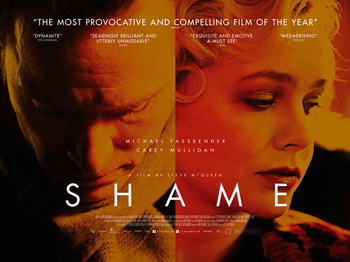LFF 2011: Shame ****
 Steve McQueen said the reason his latest drama isn’t based in the UK is trying to get sex addicts over here to open up proved nigh impossible during the research into the film. Sex addiction is still a dirty, sleazy subject, with connotations of men in rain macs lurking precariously in dark corners waiting for favours that it’s hardly surprising. So, it’s a bold topic to tackle by McQueen, with an even bolder full frontal shot within the first 5-10 minutes of his muse and star ‘addict’ Michael Fassbender as Brandon Sullivan – an ‘eye’ opener that makes no compromise for what lies ahead.
Steve McQueen said the reason his latest drama isn’t based in the UK is trying to get sex addicts over here to open up proved nigh impossible during the research into the film. Sex addiction is still a dirty, sleazy subject, with connotations of men in rain macs lurking precariously in dark corners waiting for favours that it’s hardly surprising. So, it’s a bold topic to tackle by McQueen, with an even bolder full frontal shot within the first 5-10 minutes of his muse and star ‘addict’ Michael Fassbender as Brandon Sullivan – an ‘eye’ opener that makes no compromise for what lies ahead.
In New York City, successful executive Brandon’s carefully cultivated private life — which allows him to indulge his sexual addiction — is disrupted when his continually troubled sister Sissy (Carey Mulligan) arrives unannounced for an indefinite stay. Her presence forces Brandon to confront his addiction as he begins to lose control.
McQueen has cultivated a disturbing and consistently dangerous environment to witness, not one necessarily of harm brought by another third party, but harm against oneself. His carefully ambivalent unravelling of Brandon’s existence is alarming as both character and viewer try to grasp the given situation, leaving you in no doubt as to the complexities and psychological terror that such an addiction can bring. In fact, McQueen presents almost ambiguous characters that invite interpretation as to the way they tick, or what could have happened in their past to explain present events, like lost souls with which we reflect our own opinions and prejudices off.
There is a distinct air of American Psycho sociopathy to the whole affair, in its coolness and calculated gain that ultimately requires an unexpected trigger for the story to change pace and evoke emotions, and hence, defence mechanisms. After Hunger, Fassbender gives a near faultless performance again at the hands of McQueen’s directing, and is utterly enthralling as Brandon as he deals with his demons, accumulating in a deeply felt outpouring of grief at the end that still leaves a question mark as to his imposed ‘road to recovery’. Mulligan as Sissy is beguiling in both a bittersweet and catastrophic sense, and after Drive, continues to demonstrate a compelling new angle for playing abused personalities with spirited determination, rather than the headstrong ones of past films.
McQueen’s Shame – aptly titled after one reoccurring word uttered by his sex addict interviewees – is harrowing without overtly trying to be, merely allowing its main players to act out their desires and face their consequences in an often claustrophobic environment, and without a sense of satisfactory closure. It also invites us to confront our own perceptions, and in doing so, interacts with them as to how the ending is subjectively taken. In this sense, it is the artist in McQueen engaging us in his filmic canvas of human suffering, without presuming to give us answers that others might arrogantly attempt to.
4/5 stars
By @FilmGazer